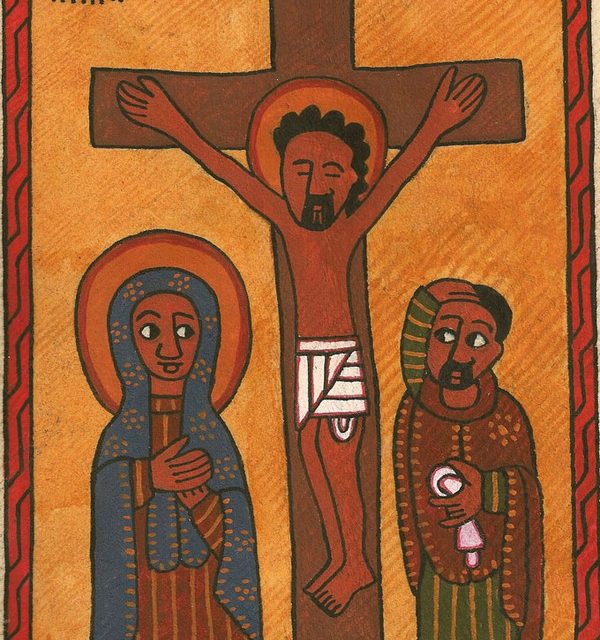All the readings for the Solemnity of the Most Holy Body and Blood of Christ may be found here on the USCCB website.
Reading 1: Isaiah 50:5-9
Responsorial Psalm: Psalm 116
Reading 2: James 2: 14-18
Gospel: Mark 8:27-35
This post was originally published by Jason King on September 12th, 2018 under the same title.
In his The Cross and the Lynching Tree, James Cone writes, “Where there is hope, there is God—that divine presence that prevents despair and empowers poor people to resist.” (143). Cone does not think that this presence of God makes one’s life easy but leads into a life of suffering. The suffering, though, is not the point. As Cone continues, “I find nothing redemptive about suffering in itself. The gospel of Jesus is . . . a story about God’s presence in Jesus’ solidarity with the oppressed, which led to his death on the cross. What is redemptive is the faith that God snatches victory out of defeat, life out of death, and hope out of despair” (150).
These quotes from Cone capture the three aspects of suffering found in this Sunday’s reading.
First, suffering is not the point of Christianity. True, there is lots of suffering in following Jesus. There is much suffering through life and history. The readings this week testify to it. In the first reading, Isaiah speaks of one who suffers, “I gave my back to those who beat me, my cheeks to those who plucked my beard; my face I did not shield from buffets and spitting.” The Psalmist cries out, “The cords of death encompassed me; the snares of the netherworld seized upon me; I fell into distress and sorrow, and I called upon the name of the Lord, ‘O Lord, save my life!’” And Jesus states that he is heading to death, “the Son of Man must suffer greatly and be rejected by the elders, the chief priests, and the scribes, and be killed,” and then, after rebuking his disciples for not believing this, reminds them that they too must “follow him,” they too must suffer.
As Cone states though, there is “nothing redemptive about suffering in itself.” The “in itself” is key here. Suffering is not an end. It is not a good. It is not to be desired as a goal. Moreover, it should not be inflicted upon others, and any use of Jesus’ teaching to perpetuate or justify suffering – instead of relieving it – has gravely misunderstood the teaching. Suffering is not the point.
Second, the point is following Christ, and suffering often results from doing so. If one actively pursues what is good, true, and loving, one ends up suffering. One ends up facing the cross. As Cone notes, God’s presence “empowers poor people to resist” and is found in “solidarity with the oppressed.” Loving God means resisting evil, and resisting evil often brings about suffering.
After describing suffering that has been inflicted on a person, Isaiah describes this person’s response to those who would bring about such harm: “If anyone wishes to oppose me, let us appear together. Who disputes my right? Let that man confront me. See, the Lord God is my help; who will prove me wrong?” Likewise, the Psalmist can state that, in the face of suffering, one confidently can “walk before the Lord in the land of the living.”
Most clearly, the Epistle of James indicates that the point of Christianity is following Christ, carrying on the work of Jesus. The author chastises people for not acting, for resignation, for assuming that faith is passive. Instead, James insists that faith animates us. It moves us to act, “What good is it, my brothers and sisters, if someone says he has faith but does not have works? Can that faith save him? If a brother or sister has nothing to wear and has no food for the day, and one of you says to them, ‘Go in peace, keep warm, and eat well,’ but you do not give them the necessities of the body, what good is it? So also faith of itself, if it does not have works, is dead.” We must work, care for our brothers and sisters, seek solidarity with the oppressed. If we are true disciples of Christ, we must do these things. That is Christianity.
Yet, if we do, suffering will find us.
Were the world different. Were the world a place where truth and doing what is right was rewarded. Were that saints not punished, those who speak up for what is good not shamed, and those who care for others not impoverished. In this broken world however, when we seek to be good and holy and loving, suffering comes to us.
This is, perhaps, where we struggle, where our hope wanes and our faith waivers. Even if we heed God’s call, respond to it with all our heart, mind, and soul, and work to love others, we encounter suffering, resistance, and defeat. Why try, why bother, with a faith that says, “If you don’t love, you’re dead, and, if you do, they’ll kill you”?
Why? This is the third point – because such suffering is not the ultimate end of creation. “God snatches victory out of defeat, life out of death, and hope out of despair”. It is this hope, this truth, that is woven into the fabric of the universe, that “prevents despair and empowers poor people to resist”.
Thus, if we follow Christ, we must show our faith in our works. When we do, we will suffer greatly, perhaps physically with beating or spitting or perhaps spirituality by our inability to stop evil. And, while it seems like there is no reason to hope or no reason to go on, we must. We must keep loving, even when it seems pointless, because we know that the end of the universe is love. God will be victorious, will triumph over death and the powers of evil, and will raise us up “after three days.” We must live according to this ultimate reality of the universe that “Whoever loses his life for [Jesus’] sake and that of the gospel will save it.”





